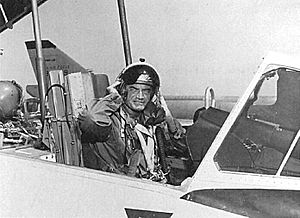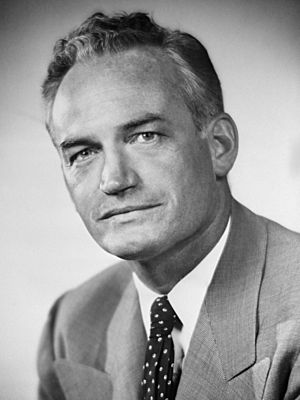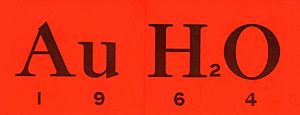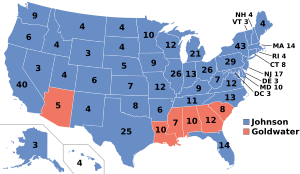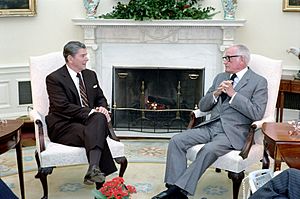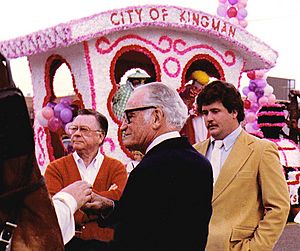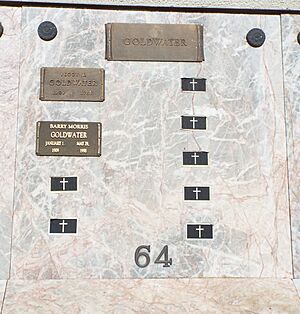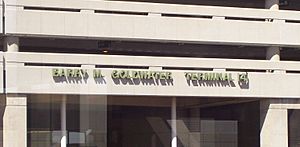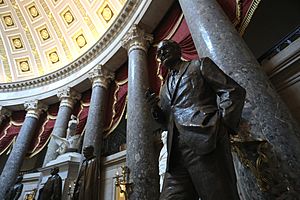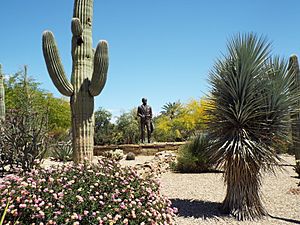Barry Goldwater facts for kids
Quick facts for kids
Barry Goldwater
|
|
|---|---|
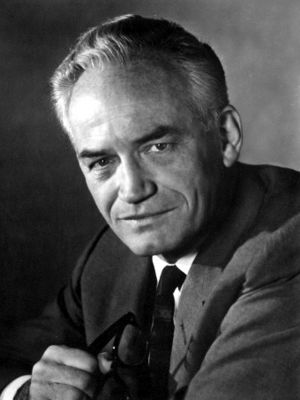
Senate portrait, 1960
|
|
| United States Senator from Arizona |
|
| In office January 3, 1969 – January 3, 1987 |
|
| Preceded by | Carl Hayden |
| Succeeded by | John McCain |
| In office January 3, 1953 – January 3, 1965 |
|
| Preceded by | Ernest McFarland |
| Succeeded by | Paul Fannin |
| Chair of the Senate Armed Services Committee | |
| In office January 3, 1985 – January 3, 1987 |
|
| Preceded by | John Tower |
| Succeeded by | Sam Nunn |
| Chair of the Senate Intelligence Committee | |
| In office January 3, 1981 – January 3, 1985 |
|
| Preceded by | Birch Bayh |
| Succeeded by | David Durenberger |
| Member of the Phoenix City Council from the at-large district |
|
| In office 1950–1952 |
|
| Personal details | |
| Born |
Barry Morris Goldwater
January 2, 1909 Phoenix, Arizona Territory, U.S. |
| Died | May 29, 1998 (aged 89) Paradise Valley, Arizona, U.S. |
| Political party | Republican |
| Spouses |
Margaret Johnson
(m. 1934; died 1985)Susan Shaffer Wechsler
(m. 1992) |
| Children | 4, including Barry Jr. |
| Education | University of Arizona (did not graduate) |
| Signature |  |
| Military service | |
| Branch/service |
|
| Years of service | 1941–1967 |
| Rank | Major General |
| Battles/wars | |
Barry Morris Goldwater (January 2, 1909 – May 29, 1998) was an American politician and a United States Air Force major general. He served five terms as a U.S. Senator for Arizona (1953–1965, 1969–1987). In 1964, he was the Republican Party's candidate for president of the United States.
Many people say Goldwater helped restart the American conservative political movement in the 1960s. Even though he lost the 1964 U.S. presidential election by a lot, many believe he set the stage for future conservative leaders. His campaign helped change the Republican Party, leading to the "Reagan Revolution" in the 1980s. He also influenced the American libertarian movement, which focuses on individual freedom.
Goldwater was born in Phoenix, Arizona, when it was still a territory. He helped run his family's department store. During World War II, he became a pilot in the United States Army Air Force. After the war, he was elected to the Phoenix City Council in 1949. He then won a seat in the U.S. Senate in 1952.
In the Senate, Goldwater disagreed with the ideas of the New Deal, a set of programs created during the Great Depression. He was known as a "maverick" because he often challenged the more moderate members of his own party. Goldwater was a member of the NAACP and supported ending segregation in Phoenix. He voted for the Civil Rights Act of 1957 and Civil Rights Act of 1960, and the 24th Amendment. However, he voted against the Civil Rights Act of 1964. He later said this decision was difficult for him because he believed in racial equality. He opposed parts of the act because he thought they went too far and were unconstitutional.
In 1964, Goldwater gathered many conservative supporters to win the Republican presidential primaries. He was the first major party candidate for president with Jewish heritage (from his father's side). Goldwater's ideas did not win over enough voters, and he lost the 1964 election to Lyndon B. Johnson by a very large margin.
Goldwater returned to the Senate in 1969. He focused on defense and foreign policy. He was respected for his honesty and principles. In 1974, he urged President Richard Nixon to resign during the Watergate scandal. This happened when it became clear that Nixon might be removed from office.
Goldwater won re-election in 1980 by a small margin. This was his last and most important term. In 1986, he helped pass the Goldwater–Nichols Act. This law made the Department of Defense stronger under civilian control. He retired in 1987. John McCain, who took his place, said Goldwater "transformed the Republican Party." Goldwater strongly supported Ronald Reagan's presidential campaign in 1980. Reagan's campaign shared many of Goldwater's earlier ideas.
Later in his life, Goldwater's views on social issues became more focused on individual freedom. He criticized religious groups trying to control the Republican Party. He supported gay people serving openly in the military, environmental protection, gay rights, and adoption rights for same-sex couples.
Contents
Growing Up and Family History
Goldwater was born in Phoenix, in what was then the Arizona Territory. His parents were Baron M. Goldwater and Hattie Josephine "JoJo" Williams. His father's family started Goldwater's Department Store, a well-known store in Phoenix. Goldwater's grandfather, Michel Goldwasser, was a Polish Jew who came to London and changed his name to Michael Goldwater. He later moved to the United States and opened a small department store in Arizona. His sons, including Goldwater's father, expanded the business.
Goldwater's father was Jewish, but Barry was raised in his mother's Episcopalian faith. His mother's family came from New England. Goldwater was an Episcopalian his whole life, though he sometimes called himself Jewish. He believed that being a good person was more important than how often someone went to church.
After struggling in high school, Goldwater went to Staunton Military Academy in Virginia. He played many sports and became a captain. He graduated in 1928 and went to the University of Arizona for one year. He left college to help with the family business after his father died in 1930. He took over the department store six years later, though he wasn't very excited about it.
Military Service
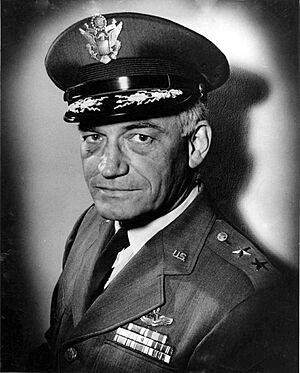
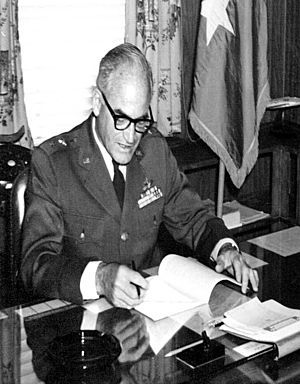
When the U.S. entered World War II, Goldwater joined the United States Army Air Force. He became a pilot and joined the Ferry Command. This new unit flew planes and supplies to war zones around the world. He often flew between the U.S. and India. He also flew over "The Hump" (the Himalayas) to deliver supplies to China, which was a very dangerous route.
After World War II, Goldwater strongly supported creating the United States Air Force Academy. He later served on its Board of Visitors. The visitor center there is now named after him. Goldwater stayed in the Army Air Reserve and, in 1946, he started the Arizona Air National Guard. He ordered the Arizona Air National Guard to be desegregated. This was two years before the rest of the U.S. military was ordered to do so.
Goldwater remained in the Arizona Air National Guard until 1967. He retired as a Command Pilot with the rank of major general. By then, he had flown 165 different types of aircraft. He continued flying planes, including the B-52 Stratofortress, even as a general.
Early Steps in Politics
Goldwater became a conservative Republican in a state that was mostly Democratic. He was friends with Herbert Hoover. He spoke out against New Deal liberalism, especially its ties to labor unions. As a pilot, radio operator, and photographer, he traveled all over Arizona. He became very interested in the state's history and nature.
He started his political career in Phoenix in 1949. He was elected to the City Council. His team won every election for mayor and council for the next 20 years. Goldwater helped build up the Republican party in Arizona. He was important in getting Howard Pyle elected as Governor in 1950.
Supporting Civil Rights Locally
Barry Goldwater was a strong supporter of racial equality. He made sure his family's business was integrated (meaning people of all races could work there) in the 1930s. He was a lifelong member of the NAACP and helped start its Arizona chapter. Goldwater made sure the Arizona Air National Guard was racially integrated from its beginning in 1946. This was two years before President Truman ordered the rest of the military to integrate. Goldwater also worked with civil rights leaders in Phoenix. They successfully integrated public schools a year before the famous Brown v. Board of Education Supreme Court decision.
Goldwater was an early supporter of the National Urban League in Phoenix. He even used his own money to cover the group's early costs. Later, the Urban League gave Goldwater an award for his 50 years of service. Even though some members disagreed because of his vote on the Civil Rights Act of 1964, the League president said Goldwater had helped them many times. He preferred to judge Goldwater by his daily actions, not just one vote.
Becoming a Senator
In 1952, Goldwater, a Republican, won a close election for a Senate seat in Arizona. He defeated Ernest McFarland, a powerful Democrat and Senate Majority Leader. Goldwater won by getting more votes in his home county, Maricopa County. He was only the second Republican to represent Arizona in the Senate. Arizona had been a very Democratic state for 40 years.
Goldwater won re-election by a larger margin in 1958. This made him the first Arizona Republican to win a second Senate term. His victory was impressive because Democrats gained many seats in the Senate that year. He did not run for the Senate in 1964, choosing to focus on his presidential campaign instead.
During his time in the Senate, Goldwater was seen as a very important figure for the Republican Party. He was known as a leading voice for conservatism in the nation.
Views on the Eisenhower Administration
Goldwater often spoke out about the Eisenhower administration. He thought some of President Dwight D. Eisenhower's policies were too liberal for a Republican president. Democrats even joked that Goldwater was so stubborn he criticized his own party's president. Goldwater felt Eisenhower was making too many compromises with Democrats.
Early in his Senate career, he criticized Eisenhower's budget. He said a $71.8 billion budget "shocks me, but it weakens my faith." Goldwater also opposed Eisenhower's choice of Earl Warren for Chief Justice of the United States. He expressed his doubts about the appointment. However, Goldwater did vote to confirm other Supreme Court nominees by Eisenhower.
Views on Civil Rights
In his first year as a senator, Goldwater helped desegregate the Senate cafeteria. He insisted that his black legislative assistant, Katherine Maxwell, be served like any other Senate employee.
Goldwater and the Eisenhower administration supported integrating schools in the South. However, Goldwater believed states should decide how to integrate, not be forced by the federal government. He criticized using federal troops for integration. He said the Eisenhower administration was overstepping its power.
Goldwater voted for the Civil Rights Act of 1957 and the 24th Amendment. He was absent for the vote on the Civil Rights Act of 1960, but would have voted for it. However, he reluctantly voted against the Civil Rights Act of 1964 when it came to the Senate floor. He later said he mostly supported the bill. But he disagreed with parts (Titles II and VII) that dealt with employment. He thought these parts would lead to the government telling businesses who to hire or fire. Only five other Republican senators voted against the bill. Goldwater likely did not realize how much this vote would hurt his image. In the 1990s, he called his vote on the Civil Rights Act "one of his greatest regrets."
The 1964 Presidential Election
Goldwater's independent and direct style made him very popular with conservative Republican voters. These voters were mainly in the South and the West. After his book Conscience of a Conservative became popular, Goldwater became a leading candidate for the Republican presidential nomination. He was expected to run against his friend, John F. Kennedy. Even though they had political differences, Goldwater and Kennedy became close friends in the Senate. They had planned to campaign together, holding debates across the country.
Republican Primary Race
Goldwater was very sad after the assassination of Kennedy. He was disappointed that his opponent in 1964 would be Vice President Lyndon B. Johnson, not Kennedy. Goldwater did not like Johnson. He found it hard to recover emotionally for the campaign. The impact of Kennedy's death, along with Goldwater's vote against the 1964 Civil Rights Act, made it harder for him to win national support. It also hurt his popularity within his own party.
At the time, the Republican Party was divided. There was a conservative wing (in the West and South) and a moderate/liberal wing (in the Northeast and Midwest). Goldwater's strong fiscal conservatism and firm stance against communism worried some Republicans. They thought he was too extreme to win a national election. So, moderate Republicans tried to find other candidates to challenge him. These included New York Governor Nelson Rockefeller and Pennsylvania Governor William Scranton. Goldwater received strong support from most Southern Republicans. He won the Republican nomination after a tough race. His main rival was Nelson Rockefeller, whom he narrowly defeated in California.
The Republican Convention in 1964
Former President Eisenhower supported Goldwater. He told reporters that Goldwater was not an extremist. However, many liberal Republicans strongly opposed Goldwater. They worried that his tough stance against the Soviet Union could lead to a nuclear war. Many important Republican leaders refused to support Goldwater. For example, New York Senators Kenneth B. Keating and Jacob Javits did not endorse him.
Despite this opposition, Goldwater gave a well-received speech when he accepted the nomination. He worked very hard on this speech. He used a famous quote from Cicero. He did not mention President Johnson by name in his speech.
The General Election Campaign
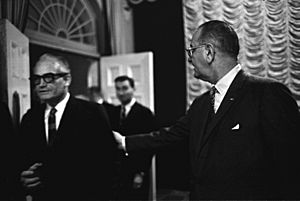
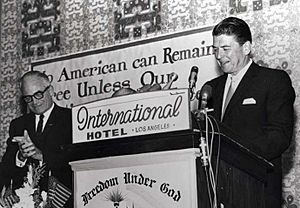
After winning the Republican nomination, Goldwater chose William E. Miller as his running mate. Miller was the head of the Republican National Committee. Goldwater joked that he chose Miller because he "drives Johnson nuts." Miller was a conservative like Goldwater. He was also a Catholic from the East Coast, which helped balance the ticket.
Former U.S. Senator Prescott Bush, a moderate Republican, supported Goldwater. His son, George H. W. Bush, who was running for Senate in Texas, also strongly supported Goldwater. William Rehnquist, who later became Chief Justice of the United States, worked as a legal advisor for Goldwater's campaign.
The Johnson campaign portrayed Goldwater as a dangerous figure. They used slogans like "In your guts, you know he's nuts." They implied that Goldwater might use nuclear weapons. Johnson himself did not mention Goldwater in his acceptance speech.
Goldwater's ideas about actively stopping communism led to strong attacks from Johnson. Johnson and his supporters said Goldwater's aggressive approach could lead to nuclear war. Goldwater had suggested that nuclear weapons should be used more like regular weapons. He even said they should have been used in Vietnam. He also joked about "lobbing one into the men's room at the Kremlin." Many saw his comments on nuclear war as very extreme.
Goldwater responded by criticizing the Johnson administration for its ethical problems. He said it was time to bring "conscience back in government." Actor Raymond Massey and Senator Margaret Chase Smith appeared in Goldwater's campaign commercials.
Before the election, a magazine called Fact published an issue claiming Goldwater was mentally unfit to be president. They based this on a poll of psychiatrists. After the election, Goldwater sued the magazine for libel and won.
Political Advertisements
A famous Democratic campaign ad, called "Daisy", showed a little girl counting daisy petals. Then, a voice counted down, followed by images of nuclear explosions. The ad ended by asking people to vote for Johnson. It implied that Goldwater would cause a nuclear war. This ad was very powerful and is seen as the start of modern "negative political ads" on TV. It only aired once but was shown many times by news stations covering the controversy.
Goldwater did not have ties to the Ku Klux Klan (KKK). However, some members of the KKK publicly supported him. Johnson used this association during the election. Goldwater, however, banned the KKK from supporting him and spoke out against them.
During the campaign, Goldwater refused to use racial tensions to gain votes. After a riot in Harlem in 1964, Goldwater told reporters that if anyone tried to cause racial violence for his campaign, he would quit the race.
Some of Goldwater's past comments were used against him. He had called the Eisenhower administration "a dime-store New Deal". Eisenhower never fully forgave him, though he did film a commercial with Goldwater. Goldwater also once joked about cutting off the Eastern Seaboard and letting it float away. This comment was used in a Johnson TV commercial. His remarks about making Social Security voluntary and selling the Tennessee Valley Authority also hurt him.
The Goldwater campaign highlighted Ronald Reagan. Reagan appeared in an ad and gave a powerful speech, "A Time for Choosing", supporting Goldwater. This speech helped launch Reagan's political career.
Election Results
Goldwater lost to President Lyndon Johnson by a huge margin. The Republican Party also lost many seats in Congress.
Goldwater only won his home state of Arizona and five states in the Deep South. These Southern states had traditionally voted Democratic. They voted Republican this time mainly because they opposed the Civil Rights Act of 1964, which Johnson had signed into law. Outside the South, the Civil Rights Act was popular. Goldwater's opposition to it hurt him greatly with voters across the country.
In the end, Goldwater received 38% of the popular vote. He carried only six states: Arizona (51% of the vote) and the Deep South states of Alabama, Georgia, Louisiana, Mississippi, and South Carolina. Winning Georgia made him the first Republican to win that state. Overall, it was the worst result for a Republican presidential candidate since World War II.
Johnson won a huge 486 electoral votes, compared to Goldwater's 52. Goldwater, being direct, said, "We would have lost even if Abraham Lincoln had come back and campaigned with us." He later believed he would have won if the country hadn't been grieving after John F. Kennedy's assassination. He felt people weren't ready for a third president in just 14 months.
Goldwater's loss also affected many other Republicans. Many who supported him lost their elections. However, the defeat of older politicians created chances for young conservatives to rise. Goldwater also permanently shifted many conservative Southerners from the Democratic Party to the Republican Party.
Experts like Steve Kornacki noted that Goldwater's strong performance in the South was a big change. It showed that the South, once a Democratic stronghold, was starting to become Republican. This shift continued in later decades. Goldwater's strong belief in freedom also helped move American politics toward a more conservative economic philosophy.
Back in the Senate
Goldwater remained popular in Arizona. In the 1968 Senate election, he was elected to the seat of retiring Senator Carl Hayden. He was reelected in 1974 and 1980.
In the late 1970s, as the conservative movement grew, Goldwater focused on his Senate work. He especially worked on military issues. Goldwater reportedly did not like Richard Nixon personally or politically. He later called Nixon "the most dishonest individual I have ever met." So, he wasn't very involved in Nixon's presidency. But he helped force Nixon to resign in 1974. During the Watergate scandal, Goldwater met with Nixon. He told Nixon to resign because impeachment was likely. After Goldwater helped convince Nixon to resign, the term "Goldwater moment" was used. It describes when powerful members of Congress openly disagree with a president from their own party.
Despite being a difficult year for Republicans, Goldwater easily won re-election in the 1974 election. He defeated his Democratic opponent, Jonathan Marshall.
At the 1976 Republican National Convention, Goldwater helped stop Nelson Rockefeller from being nominated again as vice president. When Reagan challenged Gerald Ford for the presidential nomination in 1976, Goldwater supported Ford. He was looking for agreement rather than strict conservative ideas.
In 1979, when President Carter recognized Communist China, Goldwater and other Senators sued him. They argued that the President could not end a treaty with Taiwan without Congress's approval. The Supreme Court dismissed the case.
Goldwater voted to confirm many Supreme Court nominees during his time in the Senate. These included Lewis F. Powell Jr., William Rehnquist, and John Paul Stevens.
Last Campaign and Senate Term
Goldwater thought about retiring from the Senate in 1980. But he decided to run for one last term. It was a surprisingly tough campaign. Some people saw Goldwater as out of touch. He hadn't visited many parts of Arizona outside of Phoenix and Tucson. His Democratic opponent, Bill Schulz, was a strong challenger. Arizona's population had grown a lot. Many new voters didn't know Goldwater well. Goldwater spent most of the campaign defending himself. He won by a very small margin, thanks to absentee ballots counted late on election night.
Goldwater's close win in 1980 happened even though Reagan won Arizona by a large margin. In 1980, Republicans gained control of the Senate for the first time since 1955. Goldwater was now in a very powerful position. In October 1983, Goldwater voted against the law creating Martin Luther King Jr. Day as a federal holiday.
In 1981, Goldwater voted for Sandra Day O'Connor to be on the Supreme Court.
After the new Senate met in 1981, Goldwater became chairman of the Senate Intelligence Committee. In this role, he disagreed with the Reagan administration in 1984. He found out that the Central Intelligence Agency (CIA) had been secretly mining the waters of Nicaragua. Goldwater had previously denied this. He wrote a note to CIA director William Casey, calling it an "act of war." He said only Congress could declare war. He accused the CIA of acting illegally without Congress's permission. Goldwater apologized to the Senate for not knowing the facts. He then voted for a resolution condemning the mining.
In his 1980 campaign, Goldwater got support from religious conservatives. But in 1981, he spoke out against religious groups trying to control politicians. He said he would "fight them every step of the way." In 1986, Goldwater said Eisenhower was the best of the seven presidents he had worked with.
He helped pass the 1984 Cable Franchise Policy and Communications Act. This law allowed local governments to require public access channels on cable TV. It also protected cable operators from being responsible for the content on those channels. On May 12, 1986, President Ronald Reagan gave Goldwater the Presidential Medal of Freedom.
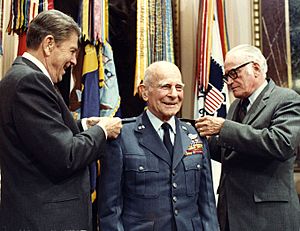
Retirement
Goldwater later said his close win in 1980 convinced him not to run again. He retired in 1987. In his last term, he led the Senate Intelligence and Armed Services Committees. Even though he was known as a fiery speaker in the 1960s, by the end of his career, he was seen as a calming influence in the Senate. He was one of the most respected members of both parties.
Goldwater remained strongly against communism and supported a strong military. However, he also supported the Panama Canal Treaty in the 1970s. This treaty gave control of the canal zone to Panama. His most important law might have been the Goldwater–Nichols Act. This law changed how the U.S. military's top command structure worked.
Key Ideas and Policies
Goldwater was most known for his work on labor union reform and his strong stance against communism. He supported the conservative coalition in Congress. His work on labor issues led to new anti-corruption laws in 1957. This caused a big campaign by the AFL–CIO to defeat him in 1958. He voted against criticizing Senator Joseph McCarthy in 1954. But Goldwater never actually accused anyone of being a communist. He strongly opposed the spread of communism worldwide in his 1960 book, The Conscience of a Conservative. This book became very important for conservative politics.
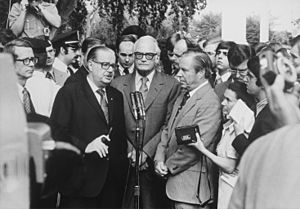
In 1964, Goldwater ran a conservative campaign that focused on states' rights. He believed that states should have more power than the federal government. His campaign attracted conservatives because he opposed federal government interference in state affairs. Goldwater voted for the Civil Rights Act of 1957 and the 24th Amendment. He would have voted for the Civil Rights Act of 1960 if he had been present. However, he voted against the Civil Rights Act of 1964. He believed that parts of the Act interfered with the rights of private businesses. He thought it might lead to racial quotas. In the 1950s, in segregated Phoenix, he quietly supported civil rights for black people. But he didn't want his name used publicly.
His ideas appealed to white Southern Democrats. Goldwater was the first Republican to win the electoral votes of all the Deep South states since Reconstruction. However, his vote against the Civil Rights Act greatly hurt his campaign everywhere else. This led to his huge defeat in 1964.
Some people saw Goldwater as an extreme conservative. But his voting record showed that his views were similar to other Republicans in Congress. According to Hans J. Morgenthau, what made him different was his strong principles and determination.
In 1971, Goldwater fought to stop U.S. funding for the United Nations. This was after the People's Republic of China was allowed to join the organization.
Goldwater and the Rise of American Conservatism
Even though Goldwater was not as important as Ronald Reagan in the American conservative movement after 1965, he shaped it from the late 1950s to 1964. Arizona Senator John McCain, who took Goldwater's Senate seat, said Goldwater "transformed the Republican Party." Columnist George Will joked that Reagan's victory in the 1980 presidential election was like counting the votes for Goldwater from the 1964 presidential race for 16 years.
The Republican Party recovered from the 1964 election. They gained many seats in the House of Representatives in the 1966 election. In 1969, after being re-elected to the Senate, Goldwater wrote an article saying he wasn't against liberals. He believed liberals were needed to balance conservatism.
Goldwater was also a strong supporter of environmental protection.
Later Life
By the 1980s, with Ronald Reagan as president, the religious right became more involved in conservative politics. Goldwater's libertarian views on personal issues became clearer. He believed these views were a key part of true conservatism. He was a strong supporter of personal freedom. He saw the religious right's views as interfering with privacy and individual liberties. Although he voted against making Martin Luther King's birthday a national holiday, he later supported it.
In 1987, he received the Langley Gold Medal. In 1988, Princeton University gave him an award for his public service.
After retiring in 1987, Goldwater criticized Arizona Governor Evan Mecham. He called him "hardheaded" and asked him to resign. Two years later, he said the Republican party had been taken over by "a bunch of kooks."
During the 1988 presidential campaign, he told vice-presidential candidate Dan Quayle to tell George Bush to "start talking about the issues."
Some of Goldwater's statements in the 1990s upset many social conservatives. He supported a Democrat in an Arizona race. He urged Republicans to leave Bill Clinton alone about the Whitewater scandal. He also criticized the military's ban on homosexuals. He said, "Everyone knows that gays have served honorably in the military since at least the time of Julius Caesar". He added, "You don't need to be 'straight' to fight and die for your country. You just need to shoot straight." A few years before he died, he told mainstream Republicans, "Do not associate my name with anything you do. You are extremists, and you've hurt the Republican party much more than the Democrats have."
In 1996, he told Bob Dole, who was running for president, "We're the new liberals of the Republican party. Can you imagine that?"
Personal Life
In 1934, Goldwater married Margaret "Peggy" Johnson. They had four children: Joanne, Barry Jr., Michael, and Peggy. Goldwater's first wife died in 1985. In 1992, he married Susan Wechsler, a nurse. Goldwater's son, Barry Goldwater Jr., served as a Republican Congressman for California.
Goldwater's grandson, Ty Ross, is openly gay. He is said to have inspired Goldwater to support gay civil rights later in his life.
Goldwater ran track and cross country in high school. In 1940, he was one of the first people to float down the Colorado River through the Grand Canyon for fun. He rowed his own boat. In 1970, a book called Delightful Journey was published. It contained the daily journal Goldwater kept during his Grand Canyon trip, including his photos.
He was a member of several organizations, including the Arizona Society of the Sons of the American Revolution, the Veterans of Foreign Wars, the American Legion, and Sigma Chi fraternity. He was also a high-ranking member of Freemasonry.
Hobbies and Interests
Amateur Radio
Goldwater loved amateur radio (ham radio) from the 1920s. His call signs were 6BPI, K3UIG, and K7UGA. The last one is now used by a club honoring him. During the Vietnam War, he was a Military Affiliate Radio System (MARS) operator.
Goldwater was a big supporter of amateur radio. He appeared in many educational films about the hobby. His first film was The World of Amateur Radio, where he talked about the hobby's history. His last appearance was in 1994, explaining a new ham radio satellite.
He also enjoyed building electronics kits. He built over 100 kits from a company called Heathkit.
Kachina Dolls
In 1916, Goldwater visited the Hopi Reservation and got his first kachina doll. Eventually, his collection grew to 437 dolls. He gave them to the Heard Museum in Phoenix in 1969.
Photography
Goldwater was an amateur photographer. He left about 15,000 of his photos to three Arizona institutions. He liked taking candid photos. He became interested in photography after his wife gave him a camera. He used different types of cameras. He was a member of the Royal Photographic Society from 1941.
For many years, he contributed photos of Arizona to Arizona Highways magazine. He was known for his pictures of Western landscapes and native Americans in the United States. Three books feature his photographs: People and Places (1967), Barry Goldwater and the Southwest (1976), and Delightful Journey (1970 reprint).
His photography sometimes mixed with his political life. President John F. Kennedy once invited Goldwater to the White House. Goldwater brought his camera and took a photo of Kennedy. Kennedy signed the photo, joking, "For Barry Goldwater—Whom I urge to follow the career for which he has shown such talent—photography!—from his friend—John Kennedy." This joke became famous. Goldwater treasured the photo his whole life.
His son, Michael Prescott Goldwater, started the Goldwater Family Foundation. Its goal is to make his father's photos available online.
UFOs
Goldwater was interested in UFOs. In 1975, he wrote that he tried to find out what was stored at Wright-Patterson Air Force Base about UFOs. But his request was denied because the information was "classified above Top Secret." He hoped the information would be released soon. In 1988, he talked about his efforts to access the secret room in an interview with The New Yorker.
Death
Goldwater stopped making public appearances in late 1996 after a major stroke. His family said he was in the early stages of Alzheimer's disease. He died on May 29, 1998, at age 89, at his home in Paradise Valley, Arizona. He died from complications of the stroke. His funeral was led by both a Christian minister and a rabbi. His ashes were buried at the Episcopal Christ Church of the Ascension in Paradise Valley. A memorial statue in a small park honors him near his former home.
Legacy
Buildings and Monuments
Many places are named after Barry Goldwater. These include the Barry M. Goldwater Terminal at Phoenix Sky Harbor International Airport, Goldwater Memorial Park in Paradise Valley, Arizona, and the Barry Goldwater Air Force Academy Visitor Center. There is also Barry Goldwater High School in Phoenix. In 2010, the Goldwater Women's Tennis Classic Tournament was started in his honor. In 2015, a statue of Goldwater was placed in National Statuary Hall in Washington, D.C. Barry Goldwater Peak is the highest point in the White Tank Mountains.
Goldwater Scholarship
The Barry M. Goldwater Scholarship and Excellence in Education Program was created by Congress in 1986. It gives scholarships to college students who want to become scientists, mathematicians, and engineers. The goal is to ensure a steady supply of highly skilled people in these fields.
This scholarship is considered one of the most important awards for undergraduate science students in the U.S. About 300 students receive $7,500 per year. It honors Goldwater's strong interest in science and technology.
Documentary
Goldwater's granddaughter, CC Goldwater, co-produced a documentary about his life called Mr. Conservative: Goldwater on Goldwater. It was first shown on HBO in September 2006.
Military Awards
- Command Pilot Badge
- Service Pilot Badge (former U.S. Army Air Forces rating)
- Legion of Merit
- Air Medal
- Army Commendation Medal
- American Defense Service Medal
- American Campaign Medal
- European–African–Middle Eastern Campaign Medal
- Asiatic–Pacific Campaign Medal with campaign star
- World War II Victory Medal
- Armed Forces Reserve Medal with three bronze hourglasses
Other Awards
- Presidential Medal of Freedom (1986)
- American Legion Distinguished Service Medal
- Marconi Gold Medal, Veteran Wireless Operators Association (1968)
- Marconi Medal of Achievement (1968)
- Bob Hope Five Star Civilian Award (1976)
- Good Citizenship Award, Daughters of the American Revolution
- 33rd Degree Mason
- The Douglas MacArthur Memorial Award
- Top Gun Award, Luke Air Force Base
- Order of Fifinella Award – Champion of the Women Air Force Service Pilots (WASP) (1978)
- Thomas D. White National Defense Award 1978
- Conservative Digest Award (1980)
- Senator John Warner Award for Public Service in the field of Nuclear Disarmament (1983)
- Alexander M. Haig, Jr. Memorial Award (1983)
- National Congress of American Indians Congressional Award (1985)
- Space Pioneer Award, Sixth Space Development Conference (1987)
- James Madison Award, American Whig-Cliosophic Society (1988)
- National Aviation Hall of Fame (1982)
Books
- The Conscience of a Conservative (1960)
- Why Not Victory? A Fresh Look at American Policy (1963)
- Where I Stand (1964)
- Conscience of a Majority (1971)
- The Coming Breakpoint (1976)
- Arizona (1977)
- With No Apologies: The Personal and Political Memoirs of Senator Barry M. Goldwater (1980)
- Goldwater (1988)
See Also
 In Spanish: Barry Goldwater para niños
In Spanish: Barry Goldwater para niños
- Electoral history of Barry Goldwater
- Goldwater Institute
- Goldwater rule
 | Jackie Robinson |
 | Jack Johnson |
 | Althea Gibson |
 | Arthur Ashe |
 | Muhammad Ali |


